Organic Ramirez Red Honey Dominican Republic – Origin
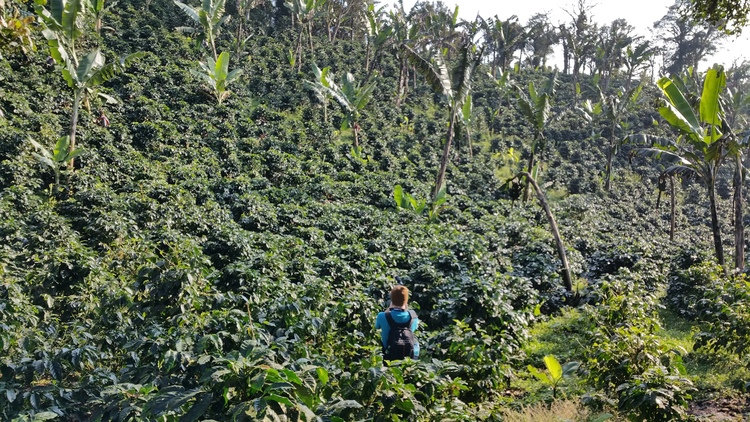
Organic Ramirez Red Honey from Jarabacoa of Dominican Republic
Variety : Red Caturra
Altitude : 1300 -1400 masl
Harvest: Jan- May
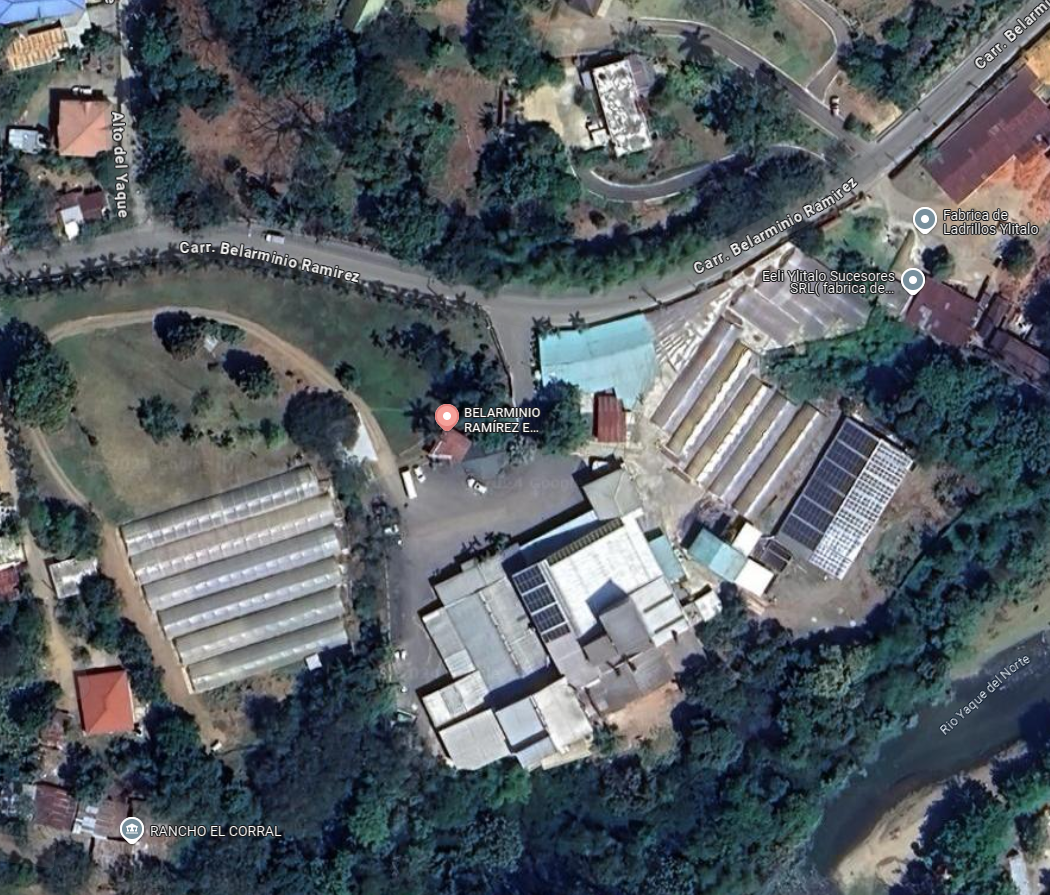
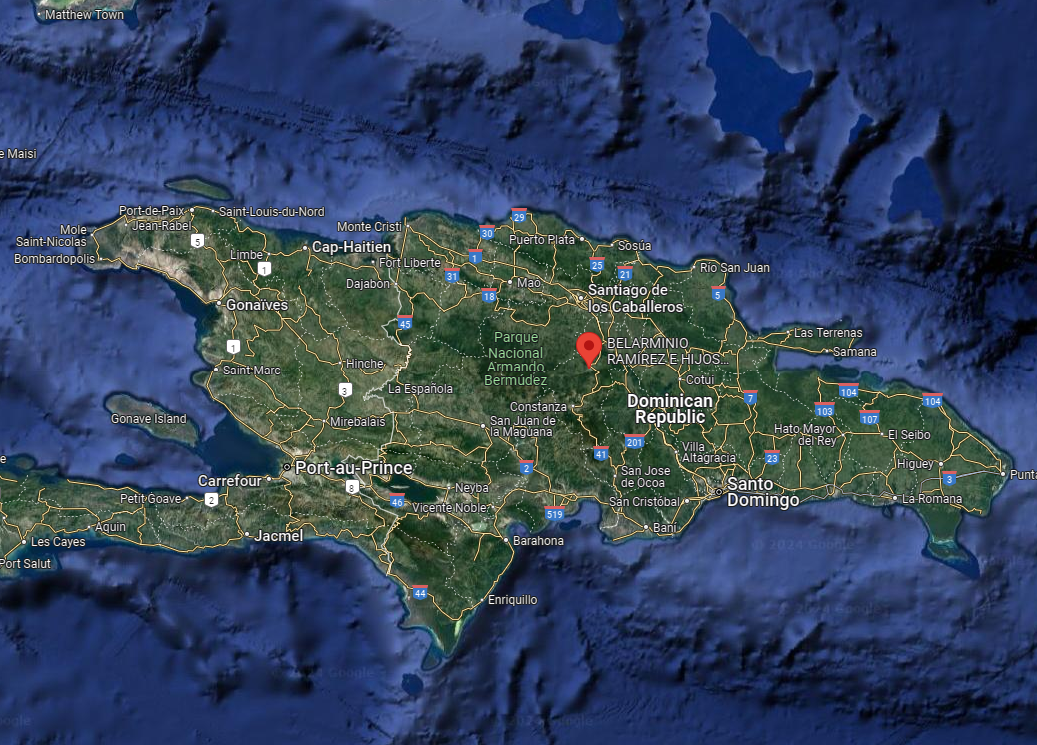
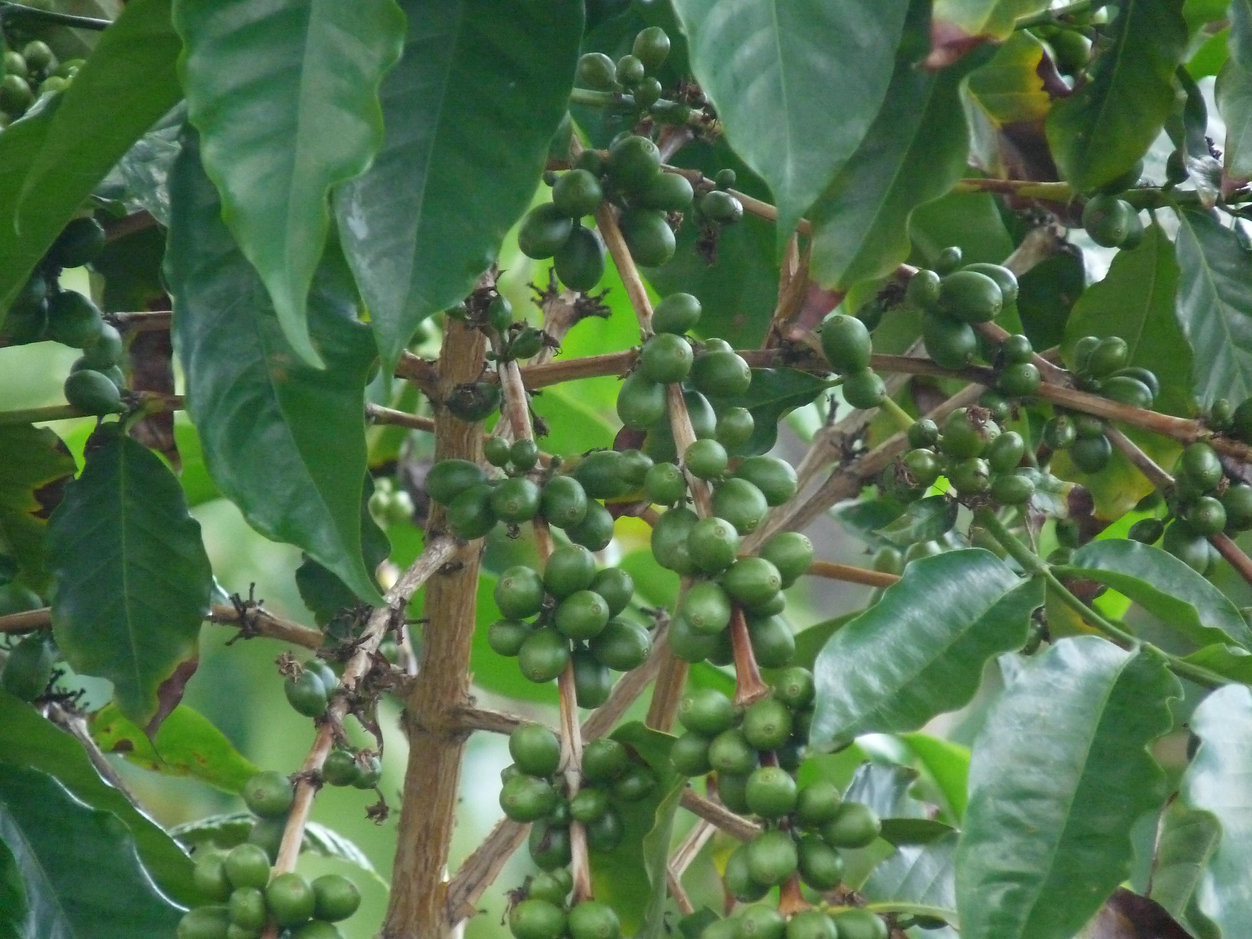
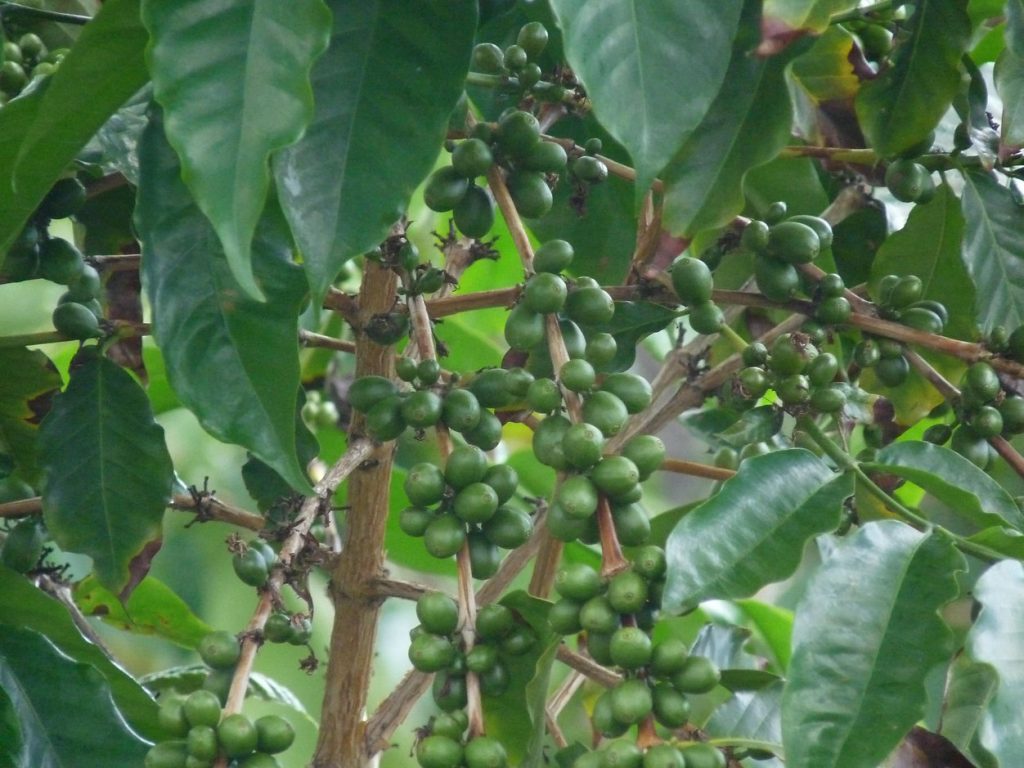
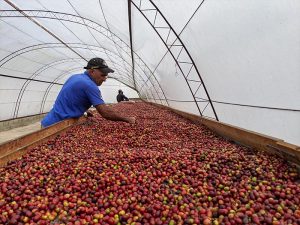

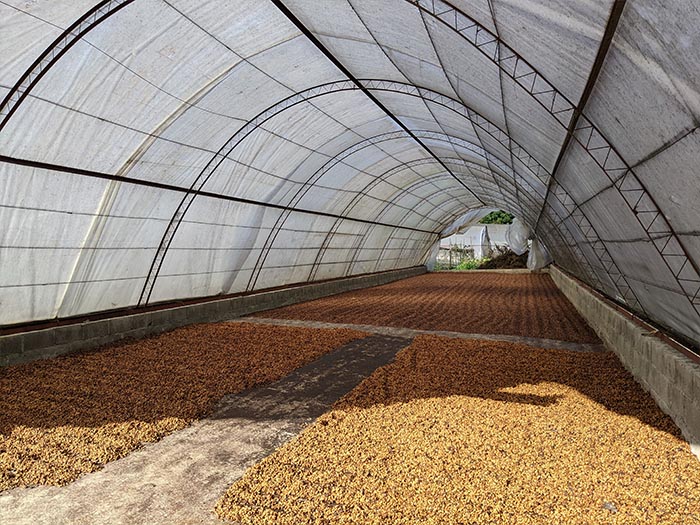
2024 July shipment
Cupping notes from vendor
With milky notes of vanilla, and a nutty aftertaste, with heavy strawberry aromas that carry over into a stone fruit flavor.
Attributes (1-7) Flavors (1 -4)
| Brightness | 3 |
| Body | 6 |
| Aroma | 5 |
| Complexity | 5 |
| Balance | 6 |
| Sweetness | 6 |
| Spicy | 1 |
| Chocolaty | 1 |
| Nutty | 3 |
| Buttery | 3 |
| Fruity | 4 |
| Flowery | 1 |
| Winey | 1 |
| Earthy | 1 |
Process notes
Red honey
BLACK, RED & YELLOW HONEY PROCESS COFFEE
Black honeyed coffees are the most labor intensive of the honey processed coffees because like natural processed coffees, most of the mucilage is still intact. Drying times can double between white and black honeyed coffees. This long drying time can lead to the potential of over-fermentation or fouling if beans are not cared for and dried at the right pace.
The trade off is that this method can bring out an amazing complexity and a depth of flavors. Black and red honeyed coffees tend to be full-bodied, sweet with fruit-forward undertones and a balanced acidity.
Yellow honey processed coffees are delightful and have flavors you might attribute to real honey: floral, sweet, and smooth with an ever-so-slight hint of fruit. Often you’ll catch the aroma of vanilla or honey, regardless of the roast level.
Overall, honey process coffees showcase the possibilities of what can be achieved combining the best flavor attributes from a washed coffee and a natural coffee into one.
The next time you come across a honey processed coffee, also try its counterparts: natural and honey process.Know that every method chosen is for specific reasons, but with one goal in mind: to bring you the most beautiful expression of natural flavors, from the farm to your cup.
Stories

From coffeebeancorral.com
Ramirez Estate Bio: In the Dominican Republic, the family-owned Ramirez Estate run by the third generation employs over 400 workers who live and work on the property and make nearly 300% higher wages than Fair Trade Standard. Before the Ramirez family purchased the land in the early 1990s, the land was impotent and bare––natural water springs had long since dried up and farmers had only been raising cattle.
Today, the Ramirez Estate is one of the most environmentally-progressive and socially-conscious proprietorships in the world because they recycle materials used during coffee bean processing. First, coffee cherry parts that would normally be thrown out are converted into natural gas through fermentation––in turn, this natural gas powers their facility. Next, the used water is also recycled, filtered, and returned to water systems. Lastly, cherry pulps are added to a compost pile where they’re used as fertilizer useful to nearby farms.
In addition to creating exceptional coffee, the Ramirez Estate also gives back to its community in countless ways. By building schools in rural areas, local children no longer have to walk nearly twenty miles a day, and after donating books and computers, students have more opportunities to learn. The Ramirez Estate also allows other farmers in the Dominican Republic to use their processing plant to assist in coffee export.
The pictures seen on our website are part of our personal experience touring the estate and meeting the Ramirez family––they are humble, honest, and produce some of the highest-scoring coffees we carry.
From burmancoffee.com
In 1943, Mr. Belarminio Ramirez started a small company dedicated to the cultivation and marketing of coffee, which over the years grew into a family tradition involving three generations already. The Belarminio Ramirez Group was named in his honor. Currently, the company owns 350 hectares of coffee production, located in the mountains of the central range between 800 and 1500 meters above sea.
This family-owned estate is extraordinarily socially conscious. They use fermented coffee cherries to create natural gas, which partially powers their operation. They also donate books and computers to the local schools, and in a more rural area, they built and funded a new school preventing small children from having to walk over 15 km each way to class. They also help Haitians obtain legal residence in the Dominican Republic, in order to receive fair wages. We pay roughly 300% higher wages to this Estate for their exceptional care of the environment, organic certification, care for local Haitian immigrants, and high cupping scores.
This coffee comes from a single estate in the Jarabacoa region of the Dominican Republic. The Ramirez Estate employs over 400 people. 40 percent of the workers are female and many of them are Haitian migrant workers. They are paid roughly 300 percent higher wages than Fair Trade to the Estate and they use a decent portion of their profits to create sustainable gas recycling (to reduce emissions), water filtration (to prevent river contamination), and to donate computers and books to many of the local schools. This estate is an example of how a coffee businesses that becomes successful should operate in their community.
Tasting Notes:
Best from the lighter side of a medium roast to as dark as you want to go. A bit cleaner tasting but slightly less fruity than previous seasons. Lighter roasting presents some nice honey processed features: citric, floral, soft fruit with an almost oak/peat like finish, sweet & complex but does risk some underdeveloped tones if you nail it a little too light. Medium roasts were our favorite, still balanced and complex but will develop the traditional chocolate and smoky tones for which Dominican coffees are known for – to balance out those more exotic fruity and citric tones. Darker roasts are a little more complex than on the washed processed version, but not as smooth and rich.
Roasting Notes:
The preparation on Ramirez Red Honey keeps getting cleaner and better every year. It will roast much more even, and has gone from high chaff, to more medium chaff levels. It will darken up a bit quicker color wise, so make sure to use the cracks as roast level guides.
This is a project coffee from Cafe Kreyol, our buddy Joey has been working with Ramirez Estates on premium chops and awesome processing methods to ensure a premium and unique product. Cafe Kreyol goes into some of the most impoverished and troubled areas that are within prime coffee growing territory, organizes farmers, teaches how to correctly process beans, guarantees purchase of the beans at way above market prices ensuring it goes directly to the farmers and strives to really turn around some of the more troubled areas, putting people to work at well above average wages and ensuring future livelihoods.
Joey, the head of Cafe Kreyol, even strives for his US employees the above statement. He finds the hardest working individuals with great work ethics that for one reason or another have really been put down with employment and troubled times to help them recover and build a resume while also being able to help others.
One can feel really good about supporting any of Cafe Kreyol’s projects and for the most part – really tasty coffees as well.


From prestogeorge.com
This coffee went through an 18-hour fermentation before depulping. The coffee was moved to patios where it is then patio dried. We store our parchment for 8 weeks prior to shipping, increasing the longevity of the acidity and sweetness in this coffee. This project started in 2017, and we have continued to develop the specific fermentation since. In 2020, the first lady flew in to meet Eddy Ramirez and nationally congratulate him on producing the highest scoring coffee that has ever come out of the Dominican Republic. The Red Honey Processed Ramirez Estate received 92 points from Coffee Review, in addition to being #22 in the top 30 coffees of 2020. As with the other coffees from the Ramirez Estate, this entire project is both environmentally and socially conscious. Ramirez uses fermented coffee cherries to create a gas that partially powers his facility. All water used to wash coffee is filtered before returning it to the land, and he uses natural shade with trees that create nitrates for the soil on his biodiverse farm. Eddy in addition, employs 20-30 Haitian coffee pickers per season, assisting them to get legal status in the Dominican Republic and paying them fair wages for a Dominican picker. Ramirez Estate Red Honey Tasting Notes/ Cupping Score Cupping Score: 92 pts Cherry and stone fruit aromas that round off into a sweet berry note and a smooth finish.